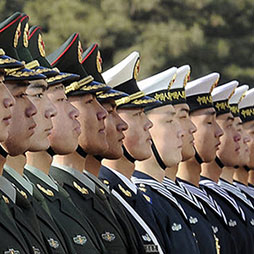Book from the People's Liberation Army Conference
"Profound Changes Unseen in a Century”: China Assesses Its Security Environment
This chapter examines how the Chinese Communist Party (CCP) analyzes its strategic environment through a case study of Xi Jinping’s message about “profound changes unseen in a century” and assesses the likely implications for the party’s calculus.
EXECUTIVE SUMMARY
MAIN ARGUMENT
In 2017, China called its overseas envoys to Beijing for a rare event. The Ambassadorial Work Conference, attended by ambassadors, diplomats, and Beijing-based foreign policy officials, was a venue for Xi to share the CCP’s assessment of international trends and direct China’s foreign policy. He had a message for the hundreds of diplomats: the world was facing “profound changes unseen in a century.” “Changes unseen in a century” is the CCP’s official assessment that strategic trends of multipolarity and economic globalization are accelerating, driven by the rise of developing economies, technological advancement, and China’s growing national power. Under Xi, the CCP has responded to these “profound changes” with new strategies to advance China’s vision for global governance and has doubled down on “struggle” to accelerate favorable strategic trends, like multipolarity.
POLICY IMPLICATIONS
- U.S. policymakers aiming to shape the CCP’s choices should appreciate its significant and enduring focus on a consistent and relatively limited set of strategic trends: multipolarity, economic globalization, and competition in comprehensive national power.
- The party places great value on comprehensive national power to predict the outcomes of future contests. This argues for greater U.S. attention to how its own comprehensive national power is publicly messaged or discussed with China’s leaders.
- Beijing’s apparent certainty in an inevitable multipolar future may offer opportunities for short-term compromise because it reduces time pressure on China’s leaders, who, assured of future victory, may dwell less on temporary setbacks that do not impede long-term goals.
Kim Fassler is a Foreign Affairs Officer at the U.S. Department of State’s Office of China Coordination.
This chapter represents only the views of the author and not those of the U.S. Department of State or the U.S. government.



